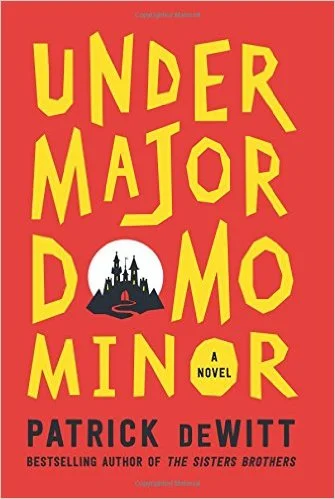A Review
Lucien (Lucy) Minor has gained employment at a mysterious barony in the Castle Von Aux, a fantastical realm equipped with royals and thieves and a constant, meaningless war. Undermajordomo Minor has its moments of good character dialogue and the writing is more than competent -- some truly wonderful notions appear at the sentence level. The trouble is that they often read as authorial intrusions or word play, rather than ideas generated from within the story or the characters, making them surprising but not necessarily delightful.
The writer Daniel Handler in his New York Times review suggested this book could be considered Patrick deWitt’s “take” on a fairy tale. However, he says he is suspicious of the lines drawn by calling what Patrick deWitt has done a "take" and goes on to rope Margaret Atwood into the dividing line conversation. I agree with his suspicion, but I do think that calling Undermajordomo Minor Patrick deWitt’s take on a fairy tale is more apt than calling The Handmaid’s Tale Margaret Atwood’s take on dystopian future.
By calling something a take necessarily summons a coopting, and to me that is exactly how Undermajordomo Minor reads. Patrick deWitt is not a fairy tale practitioner, he is a literary novelist, which comes with its own tropes and clichés (as one of my teachers is fond of pointing out). Like many postmodern tomes, Undermajordomo Minor hits a point of drag in the middle. In his essay Not Knowing, Donald Barthelme states that one of the criticisms against the postmodern novel is “that this kind of writing has turned its back on the world, is in some sense not about the world but about its own processes, that it is masturbatory, certainly chilly, that it excludes readers by design, speaks only to the already tenured, or that it does not speak at all, but instead, like Frost’s secret, sits in the center of a ring and Knows.”
Barthelme goes on to refute this notion, but Undermajordomo Minor does not.
The thing is, in myth and fairy tale the story is the point, entertaining the audience is the point. Both of those things have been abandoned in Undermajordomo Minor in favor of the cleverness and word play. I am particularly fond of word play and I would say that was my favorite part about Undermajordomo Minor. Still, I found this notion of excluding the uninitiated particularly frustrating during a moment between the baroness and Lucy:
“Exhaling sharply, she clapped the book shut and said, “I for one find it an annoyance when a story doesn’t do what it’s meant to do. Don’t you, boy?”
“ I’m not sure I understand what you mean, ma’am.”
“ Do you not appreciate an entertainment?”
“ I do.”
“ And would you not find yourself resentful at the promise of entertainment unfulfilled?”
“ I believe I would, ma’am.”
“ There we are, then.”
“ We are here,” Lucy agreed.””
In Undermajordomo Minor the fairy tale reads like an excuse for a lack of consequences and flat characters. Lucy commits crimes and gets away with them, because he is the hero, I guess. For example, he steals money from a barony that is teetering on financial ruin, and there is even a character, Mr. Olderglough (the majordomo of Castle Von Aux), whose job is to oversee the remaining financials but for some reason he lets it slide. I’m not exactly sure what his ultimate role in the story is besides giving Lucy a job with very little responsibly so he can be called to adventure and still have the time to take it. It is as though Patrick deWitt has taken the two least meaningful aspects of craft from both genre-less modern novels and fairy tales, crossbred them, found it boring and then decided that was the point.










Carmen Maria Machado’s genre-bending memoir is a formally dazzling and emotionally acute testimony of an abusive queer relationship.